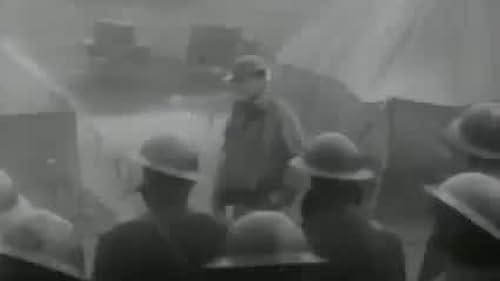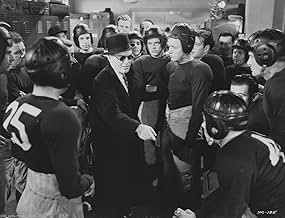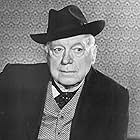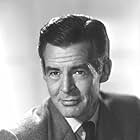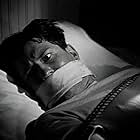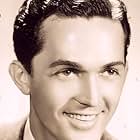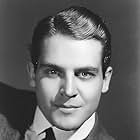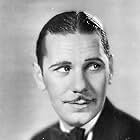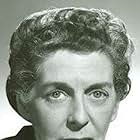Aggiungi una trama nella tua linguaCoach Frank Cavanaugh returns to college football after World War I, then gradually goes blind.Coach Frank Cavanaugh returns to college football after World War I, then gradually goes blind.Coach Frank Cavanaugh returns to college football after World War I, then gradually goes blind.
Kirk Alyn
- John Cavanaugh
- (non citato nei titoli originali)
Robert Andersen
- Minor Role
- (non citato nei titoli originali)
Steve Barclay
- Football Player
- (non citato nei titoli originali)
Brandon Beach
- George - Dartmouth Alumnus
- (non citato nei titoli originali)
Brooks Benedict
- Dartmouth Alumnus
- (non citato nei titoli originali)
Dean Benton
- William Cavanaugh
- (non citato nei titoli originali)
Robert Benton
- Football Player
- (non citato nei titoli originali)
Robert Bice
- High School Coach
- (non citato nei titoli originali)
Louis Borel
- French Officer
- (non citato nei titoli originali)
Bonnie Braunger
- Baby
- (non citato nei titoli originali)
Virginia Brissac
- Mrs. Ayres
- (non citato nei titoli originali)
Trama
Lo sapevi?
- QuizThrough the latter stages of the film it is shown that Cavanaugh was losing his sight. However, a fact not revealed is that when he died he was also broke. According to "Tales from the Boston College Sideline" (Reid Oslin) he warned former player Joe McKenney (later a coach) to "get out of coaching while you can - the end of every coaching career is disaster."
- BlooperIn the Fordham=NYU game the announcer reports that Fordham scores a touchdown, putting them ahead 13-0. Watching the visual image, however, clearly shows that the player is stopped 3 or 4 yards short of the touchdown, and the crowd does not respond to any touchdown.
- Curiosità sui creditiRKO Pictures wishes to gratefully acknowledge the gracious cooperation of ... and Major Frank Cavanaugh's legion of friends and admirers.
- Colonne sonoreAcademic Festival Overture Op. 80
(1880) (uncredited)
Written by Johannes Brahms
In the score during the acknowledgement of college cooperation
Recensione in evidenza
Pat O'Brien made at least three films where he played a college football coach. The first, COLLEGE COACH, was amazing because O'Brien stood for the exact opposite of his character in KNUTE ROCKNE. Instead of clean living and sportsmanship, in COLLEGE COACH, O'Brien emphasized that you should do anything to win...anything!! While this message was simply awful, the film was so vile in its message that you can't help but watch. Later, with KNUTE ROCKNE, the image was now squeaky clean and the film went on to become an iconic classic. So with these two films under his belt, why would anyone want to make yet a third film--especially when it is essentially KNUTE ROCKNE all over again?! Yep, the reason must be money! It can't be because the story in the IRON MAJOR is compelling--because frankly it isn't. In fact, I can't think of a single reason for O'Brien to have made what is essentially "KNUTE ROCKNE II" other than the money!
The film purports to be the story of one of the winningest coaches in college football history. Frank Cavanaugh had an incredible .731 winning percentage and did a lot to improve the game in the early 20th century. But to base an entire film around the man was a mistake, as his life story wasn't that interesting or unique. Plus, throughout the film, I couldn't help but notice that Cavanaugh couldn't keep a job--bouncing from school to school. If he was so great, why did he coach for six different programs? His nobility (which Warner Brothers tried so hard to point out) didn't seem so great and he never really was an institution at any of the schools. And, as a consequence, he's all but forgotten today. And, with KNUTE ROCKNE getting so much attention, THE IRON MAJOR is also pretty much forgotten today.
Watchable but frankly (get it?), you'd be better off watching one of O'Brien's other football films instead.
The film purports to be the story of one of the winningest coaches in college football history. Frank Cavanaugh had an incredible .731 winning percentage and did a lot to improve the game in the early 20th century. But to base an entire film around the man was a mistake, as his life story wasn't that interesting or unique. Plus, throughout the film, I couldn't help but notice that Cavanaugh couldn't keep a job--bouncing from school to school. If he was so great, why did he coach for six different programs? His nobility (which Warner Brothers tried so hard to point out) didn't seem so great and he never really was an institution at any of the schools. And, as a consequence, he's all but forgotten today. And, with KNUTE ROCKNE getting so much attention, THE IRON MAJOR is also pretty much forgotten today.
Watchable but frankly (get it?), you'd be better off watching one of O'Brien's other football films instead.
- planktonrules
- 15 feb 2009
- Permalink
I più visti
Accedi per valutare e creare un elenco di titoli salvati per ottenere consigli personalizzati
Dettagli
- Tempo di esecuzione1 ora 25 minuti
- Colore
- Proporzioni
- 1.37 : 1
Contribuisci a questa pagina
Suggerisci una modifica o aggiungi i contenuti mancanti

Divario superiore
By what name was The Iron Major (1943) officially released in Canada in English?
Rispondi
